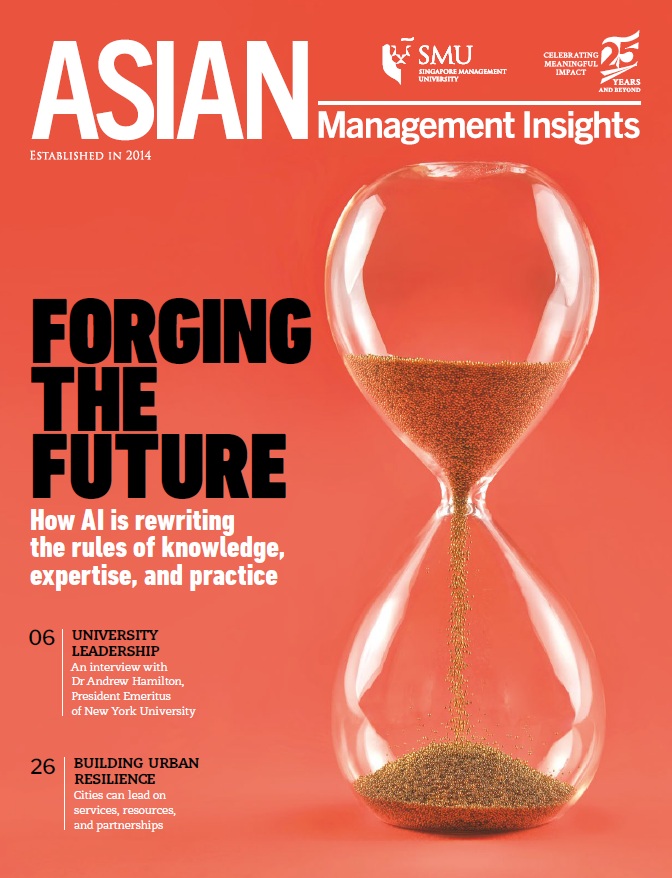This issue, as we continue to celebrate Singapore Management University’s (SMU) 25th anniversary, we explore leadership in higher education, the rise of artificial intelligence (AI), ethical stewardship, and other challenges, highlighting how they intersect in our increasingly complex, fast-changing world.
During China’s 2025 college entrance examinations in June, the country’s biggest tech companies disabled certain AI features to prevent cheating. From Tencent’s Yuanbao to Moonshot’s Kimi, all image-recognition capabilities had been turned off to ensure fairness in the high-stakes exam. The irony: China has been promoting AI adoption in schools, mandating at least eight hours of AI instruction per year starting from primary school.
Educators worldwide are also using AI when crafting lessons, illustrating the profound change that AI and large language models (LLMs) have wrought on the creation and transmission of knowledge. How should pedagogy be adjusted to address the changing ways students learn? What should universities do to maximise AI’s potential while upholding academic integrity? And how should leaders beyond academia think about AI output when it is increasingly viewed as authoritative truth? Kenneth Benoit, Dean of SMU’s School of Social Sciences, answers those questions.
AI is just one of many challenges currently facing university leadership. Andrew Hamilton, President Emeritus of New York University (NYU) and former Vice- Chancellor of Oxford University, casts an eye on the globalisation of higher education, the important yet limited role of rankings, and the need to create meaningful impact. Above all, university leaders must remain steadfast in their commitment to the core mission of creating and disseminating knowledge.
How can embracing religious literacy, ethical traditions, cultural humility, and relational thinking help universities and society at large navigate today’s complex global challenges? SMU Provost Alan Chan believes that by understanding our faith and culture and those of other people, we would learn how to listen with an open mind, thereby creating genuine insights that improve the human condition.
Storytelling forms much of the scaffolding of religion and culture, holding large groups of humans together. It is also an under-utilised tool in translating strategy into practice, says Tanvi Gautam. By inviting middle managers and frontline staff to articulate the strategy in their own words, storytelling translates mission into meaningful execution. Crucially, it creates clarity and bridges the strategy gap.
Effective strategy execution will make a significant difference in global sustainability efforts, particularly in building urban resilience. Winston Chow points out five key areas to address: affordable housing, reliable municipal services, collaborative governance, equitable energy transitions, and resilient water management. Knowledge-sharing and collective action will be key, but mayors and city leaders play a crucial role in delivering an inclusive, equitable, and resilient urban future.
Care for the planet is part of what Shai Ganu calls the five Ps of corporate stewardship: Purpose, People, Planet, Protection, and Performance. Beyond the traditional focus on compliance and risk mitigation, corporate boards must now adopt a stewardship mindset for long-term value creation and ethical leadership. In essence, it is about striking a balance between profit and purpose.
Profit might be the purpose of private equity (PE) firms, but what is PE really about? Yin Wang and Steve Balaban lay out the reality behind the glamour epitomised by Shark Tank and spell out how PE firms create value. PE has evolved into an established pillar in the global financial arena, and while it offers high returns through value creation at various stages of a company’s lifecycle, wielding it well requires deep expertise and rigorous due diligence.
SoftBank is one of the world’s biggest PE firms, and its most successful investment is Alibaba. Jack Ma’s venture became an e-commerce behemoth by being China’s foremost online marketplace, but with it came the issue of counterfeit listings. In this issue’s Case in Point, Liang Chen, Cheah Sin Mei, Can Huang, and Guoqiao Liu show how Alibaba harnessed the power of AI to take down counterfeit listings before they can generate any sales.
While Jack Ma is the personification of the classic rags-to-riches story, Roshni Mahtani Cheung went from riches to rags and back again. The founder and CEO of theAsianparent and The Parentinc shares in The Entrepreneur’s Corner her lessons of resilience learnt the hard way, as she grew a parenting website into a multimillion-dollar business while raising a family, and signed term sheets while in the labour room. What would she say to her hard-charging younger self? “You have to give yourself grace.”
With US import tariffs causing global uncertainty, multinational enterprises (MNEs) are rethinking where to manufacture their products. What happens to local businesses when an MNE leaves a location? How can policymakers determine whether the benefits of an MNE staying would exceed the costs of concessions to make it stay? Chang Pao Li’s latest research attempts to answer those questions in the Singapore context.
Should companies be issuing Return to the Office (RTO) orders now that Work from Home (WFH) is no longer a necessity in the post-pandemic world? Vineeta Dwivedi and Snehal Shah propose a WFH personae framework that takes into consideration an organisation’s operational and cultural flexibility to craft effective hybrid work policies. When executed well, it aligns employee needs with operational goals.
As global complexity continues to reshape our world, it is clear that thoughtful leadership will be the compass that steers education, enterprise, and society towards a more resilient and inclusive future.
